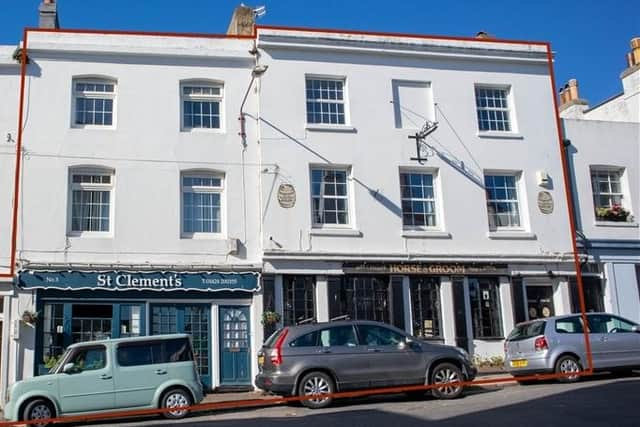Hastings pub history: Fascinating past of popular St Leonards pub that is up for sale
and live on Freeview channel 276
Here local pub historian David Russell uncovers some incredible facts about the oldest pub in St Leonards and how it came to be built.
The Horse and Groom, St Leonards oldest pub, was built and first opened in 1829 by glazier Stephen Millsted for the benefit of the workforce busy constructing the new town of St Leonards on Sea. It is on record that they were so thirsty that the pub opened before the windows were installed.
Advertisement
Hide AdAdvertisement
Hide AdThe workforce attended the Horse and Groom on Saturday nights to be paid their wages and were called in from the street one by one. They came again on Sundays to quench another thirst, this time to listen to the national and local newspapers being read aloud. Edward Thebay, an auctioneer, was ‘Sunday reader’ at the Horse and Groom for many years.The Horse and Groom was then regarded as a ‘Tory rendezvous’ and in the parliamentary election of 1835, the Conservative candidate, Joseph Planta, had one of his committee rooms here. It was common practice to bribe the voters and the Horse and Groom gave out a butt of porter plus wine, spirits and ale every day of the campaign in support of the corrupt candidate.


An early landlord, John Woods, was described as ‘cheerful, with a simple integrity and a strict disposition, but ill-fitted to be a publican. For sport or for gain his customers, after taking a drink from their pots, would shout: “Look here Woods, do you call this a proper measure”. He refilled their pots, not realising he had been duped. After a year he gave up to become Hastings postmaster.’
On a Wednesday afternoon in May 1853 the body of a shoemaker was laid out for inspection at a Coroner’s Inquest held in the Horse and Groom parlour. The dead man, a regular called Stephen Smith, lived and worked in a small room in Harold Mews behind the pub. The previous evening, he and his wife Sarah had been into Hastings drinking at the Queen Adelaide beer house in the Old Town, but had become separated on the way home. This had led to an argument and to Sarah Smith fatally stabbing her husband with his shoemaker’s knife. A neighbour called the police and a doctor:
Meanwhile a few years later in the public bar, the Horse and Groom was threatened by the ‘London matchbox trick’. A tramp, who called in for a drink, was accused of stealing a bottle of whisky. He took a light for his clay pipe from the gas lamp behind the bar and turned out the lamp. Whilst the barman searched for matches the tramp snatched a bottle of whisky. In court he claimed he had never heard of the matchbox trick, had never been to London and had walked straight from Edinburgh. He got three months. This was in 1871.
Advertisement
Hide AdAdvertisement
Hide AdDuring the First World War hundreds of Canadian soldiers were billeted along the sea front. They used the St Leonards pubs which had severe restrictions imposed upon them. In 1915 Lloyd George, then Minister for Munitions, declared “we are fighting the Germans, the Austrians and drink, and so far as I can see the greatest of these deadly foes is drink”. He then reduced pub hours, watered the beer and increased its price. ‘Treating’ became illegal.
In one of many incidents, Mary Dann, who also lived in Harold Mews, was charged with ‘supplying intoxicants to soldiers, with intent to make them less efficient’. She had purchased a considerable amount of beer and spirits in the Horse and Groom and seven Canadians were found drunk in her house. She received a brutal three months imprisonment.
A few months later, Ernest Tompkins, landlord from 1909 to 1924, was charged under the same Defence of the Realm Act, but this time three witnesses gave contradictory evidence and the case was dismissed. His lawyer remarked: “If this man is found guilty no pub in England is safe”.
In 1999 the Horse and Groom had another moment of fame, when the activities of one of its customers hit the national headlines. Regulars were dumbfounded when they read in the national press that fellow drinker Alan Kelly, of Norman Road, had turned up in Serbia among a group of Kosovan freedom fighters being disarmed by NATO troops. Frustrated by the atrocities he had seen on television at home in St Leonards, he had volunteered for two months. Landlord David Sansbury said: “He told us he was going to Kosovo and everybody in the pub chuckled and wondered how far he would get. Anyone who can help the Kosovars in any way is doing good, but you would hardly call him a prize-fighter and I have not heard that he has had any military experience. I defy you to dislike him. He is a bloke who likes a drink, real ale is his tipple.”
Have you read? Popular St Leonards pub is up for sale.